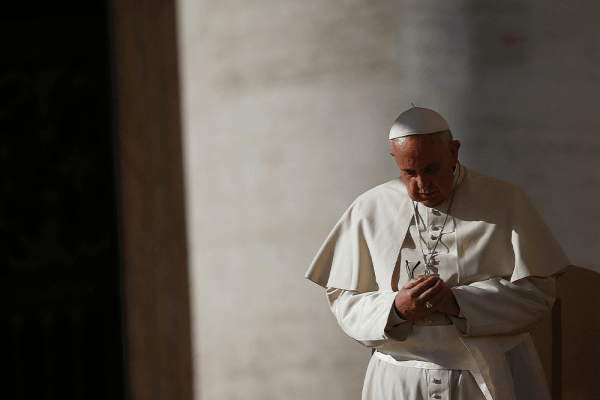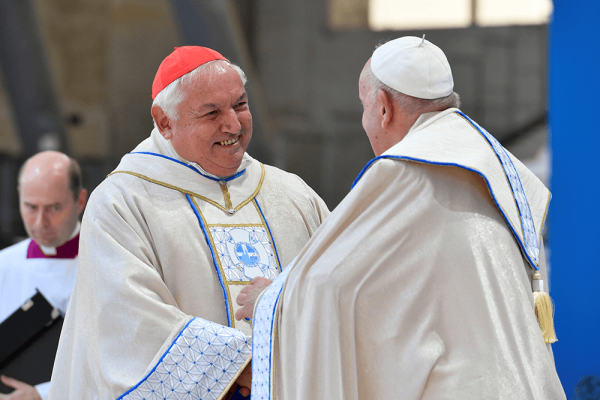“You will know the truth and the truth will set you free” (John 8:32).
I’ve thought about these words of Jesus each year as we mark the anniversary of the Jan. 6 insurrection. In the years since, telling the truth about what happened that day has increasingly become a Christian imperative. And as we enter a new presidential election year, what many Americans believe about the events of Jan. 6 — and all that led up to it — will be a key factor in how they vote.
According to recent polling from the Washington Post and the University of Maryland, Republicans are now “more sympathetic to those who stormed the U.S. Capitol and more likely to absolve Donald Trump of responsibility for the attack than they were in 2021.” The same polling found that Americans were now slightly less likely to believe that President Joe Biden’s win was legitimate and more likely to believe there was “solid evidence” of voter fraud. But there’s good news: Despite these gains, this pernicious revisionist history is not persuading the majority of Americans, 58 percent of whom say the people who entered the U.S. Capitol “threatened democracy,” compared to just 12 percent who said those entering the Capitol “defended democracy.”
In a spirit of love, we must not waver in telling the truth about what is exceedingly well documented: On January 6, 2021, then-President Donald Trump incited a crowd of his supporters to violently attack the U.S. Capitol in an attempt to stop Biden from being officially certified the winner of the 2020 election.
Strongmen and authoritarian leaders often seek to bend the truth to their own will, sowing confusion so that people have a hard time discerning what is true and what is falsehood. Over the past three years, we’ve seen Trump and many of his supporters try to spin a version of Jan. 6 in which the rioters were just peaceful demonstrators — or as one Republican congressman laughably put it in 2021, a “normal tourist visit.” In 2022, the Republican National Committee went as far as officially declaring the Jan. 6 attack on the Capitol and the events that led to it as “legitimate political discourse” even as they rebuked the only two Republican lawmakers who participated in the House investigation. More recently, Trump has recast those who have been convicted of insurrection charges as “hostages.” Of course, Trump supporters had every right to peacefully protest outside the Capitol that day. What they didn’t have a right to do was to break through barricades, violently attack the police, and unlawfully burst into the Capitol building to stop the certification of the election results. These are felony crimes that shouldn’t be whitewashed, minimized, or normalized in our politics.
Late last year, after revisiting the searing history of racial injustice in the U.S. at the Legacy Museum in Montgomery, I was reminded just how powerful narratives can be in shaping — or misshaping — our memory and reality. As the museum so compellingly illustrates, we’ve seen revisionist histories used throughout U.S. history to whitewash or erase grave injustice, including the “Lost Cause” narrative that emerged after the Civil War — an insidious lie that attempted to divert attention from slavery as the root cause of the war and instead insist the war was fought because of Northern aggression and Southern pride. This lie helped embolden a resurgence of white supremacy in the South and fuel efforts to dismantle the short-lived period of Reconstruction, replacing it with the system of Jim Crow segregation and an era of racial terror. Bryan Stevenson, executive director and founder of the Equal Justice Initiative, which created the Legacy Museum, has often argued that “the North won the Civil War but the South won the narrative war.” In a similar vein, while Biden clearly won the 2020 election, Trump and his allies managed to succeed in spreading “the Big Lie” that the election was stolen. As a result, they have severely damaged trust in our election and we remain embroiled in a narrative war about Jan. 6 that has dire consequences for our nation’s future.
In recent months, Trump has tried to downplay the rising critiques of his authoritarian rhetoric and plans through deflection, arguing that Biden and Democrats represent the real threat to democracy. As many in the media have noted, Trump and his campaign realize that the anti-democratic critiques leveled against them are a real liability in the general election; they’ve responded by trying to muddy the waters, accusing Biden and Democrats of weaponizing the Justice Department to indict Trump — which they hope to persuade voters is the real threat to democracy.
During the Reconstruction, Christians had to decide whether they would tell the truth about why the Civil War was fought or allow the “Lost Cause” narrative to take root in their communities and churches. But despite the witness of people like Frederick Douglass — who in the years before the war drew a sharp contrast between “Christianity of Christ” with the “hypocritical Christianity of this land” that endorsed slavery — we know that many Christians embraced the “Lost Cause” narrative, embellishing their churches with Confederate flags as symbols of history and heritage. Even more painfully, many of the nearly 4,000 documented lynchings across the South following Reconstruction took place on Sundays with the blessing of ministers and congregants immediately following church services.
Today, we face a similar choice: Will we be silent about the pernicious revision of Jan. 6 or will we be vocal and bold in our efforts to persuade everyone in our sphere of influence that Jan. 6 was in fact an insurrection that is a stain on our nation’s history that must be taken seriously and never be repeated. Instead of shaming or villainizing the many Americans who continue to hold on to lies and mistruths about Jan. 6, we must seek to change their hearts and their minds through grace and tough love.
Reckoning with what happened on Jan. 6 — and building a shared narrative about the truth — continues to be both a civic and a moral imperative. I hope we choose to embrace the truth and let it set us free so that together we can push forward the ongoing project of becoming an inclusive and just multi-racial democracy.
Got something to say about what you're reading? We value your feedback!







